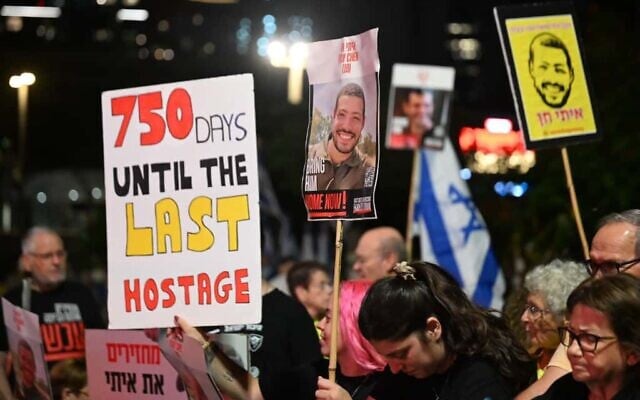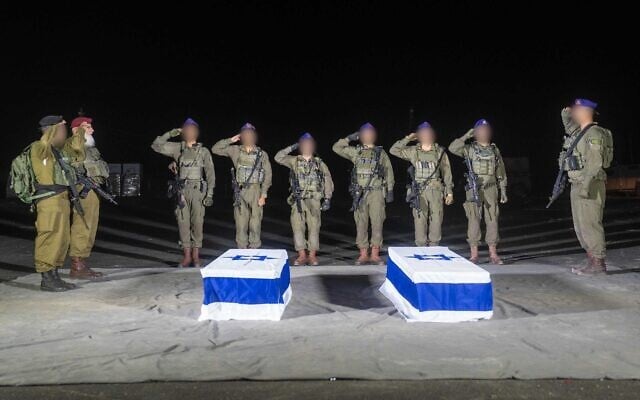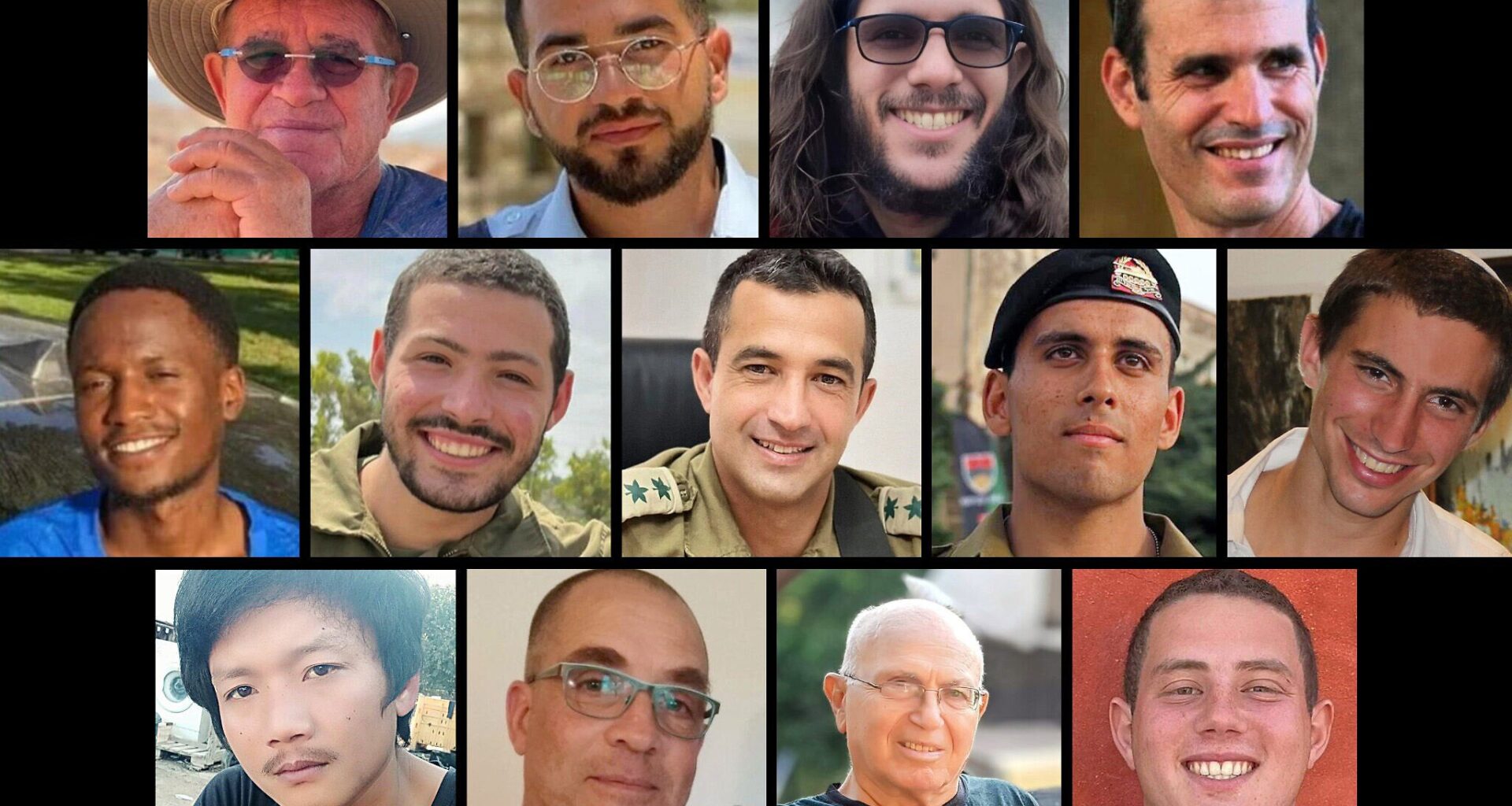The families of Israeli hostages on Monday demanded that the next steps in the US-brokered Gaza peace plan be put on hold until Hamas returns the remaining bodies of dead captives.
“Hamas knows exactly where every one of the deceased hostages is held. Two weeks have passed since the deadline set in the agreement for the return of all 48 hostages, yet 13 remain in Hamas captivity,” the Hostages and Missing Families Forum said.
“The families urge the Government of Israel, the United States administration and the mediators not to advance to the next phase of the agreement until Hamas fulfills all of its obligations and returns every hostage to Israel,” said the main organization representing hostages’ families.
The message came amid a looming 48-hour deadline for Hamas to return the remaining hostages, set Saturday by US President Donald Trump, who spearheaded the ceasefire deal.
The ceasefire between Israel and Hamas took effect on October 10, pausing the Gaza war.
Get The Times of Israel’s Daily Edition
by email and never miss our top stories
By signing up, you agree to the terms
Before the ceasefire, the terror group was holding the bodies of 28 dead hostages. It has since returned 15 of them, along with all 20 surviving hostages, of the 251 who were abducted during the October 7, 2023, massacre in Israel that precipitated the war in Gaza.

Protesters gather at Hostages Square in Tel Aviv for a rally demanding the return of the last 13 deceased hostages, on October 25, 2025. (Paulina Patimer/Hostages and Missing Families Forum)
Hamas claims it has not yet been able to locate the bodies of some of the remaining 13 hostages, and has not returned any bodies since last Tuesday, saying it needs assistance in locating and recovering them.
However, Israel is reportedly certain the terror group can hand over more bodies but is refusing to do so, and is also holding back information about their location, in a direct breach of the October 9 hostage-ceasefire agreement. Trump has made the same accusation. The agreement allows for the possibility that Hamas may not be able to return all of the remains in the opening stages of the ceasefire, stating that after that, it is required to share any information it has and “exert maximum effort” to find the remaining hostages.
In the past two days, Egypt has sent recovery crews and heavy earth-moving equipment into Gaza, with Israeli approval, to help with the recovery operation.
The stepped-up efforts to recover the last 13 bodies came after Trump warned on Saturday that Hamas would be to blame if the ceasefire collapsed, and said he would be watching the terror group’s actions “very closely” over the next 48 hours, to ensure that it resumed handing over bodies.
Hamas says it is committed to the ceasefire and insists it is trying to return 13 more bodies — 11 Israelis and one each from Thailand and Tanzania — but that the search has been hampered by the destruction wrought on Gaza during the war.
In a statement to media on Saturday, lead Hamas negotiator Khalil al-Hayya said: “There are challenges in locating the bodies of Israeli captives because the occupation has altered the terrain of Gaza.
“Moreover, some of those who buried the bodies have been martyred or no longer remember where they buried them.”

IDF Chief Rabbi Brig. Gen. Eyal Krim (left) and other troops salute over the caskets containing the bodies of Ariel Zalmanowicz and Tamir Adar, after they were returned to Israel by Hamas on October 21, 2025. (Israel Defense Forces)
No firm timeline has been put on the next stages of the plan, but the Trump administration is working to set up an international security force with troops from Arab and Muslim nations to police the truce as part of its second stage, which also includes the disarmament of Hamas.
A string of top White House officials, including Vice President JD Vance, were in Israel last week to make sure the ceasefire in Gaza holds, even after a deadly Hamas attack on IDF troops and amid its failure to hand over all the bodies of slain hostages.
The US military has also set up a coordination center in southern Israel to monitor the ceasefire and to coordinate aid and reconstruction, but aid agencies are pushing for greater access for humanitarian convoys inside Gaza.
Israel has withdrawn its forces from Gaza’s main cities but still controls around half of the territory from positions on a so-called “Yellow Line,” and it has resisted calls to allow aid through the Rafah border crossing with Egypt. As part of the ceasefire deal, it also released nearly 2,000 Palestinian security prisoners, among them around 250 who were serving life sentences for deadly terror attacks on Israelis.
Channel 12 reported Sunday that after several days of Hamas failing to hand over hostages’ bodies, Israel over the weekend considered halting aid deliveries in order to pressure the group into fulfilling its end of the deal, but the Trump administration blocked the move, fearing it would lead to the collapse of the truce.
Watch DocuNation Season 3: The Heart of Israel
when you join the ToI Community
Support The Times of Israel’s independent journalism and receive access to our documentary series, DocuNation: The Heart of Israel.

In this season of DocuNation, you can stream eight outstanding Israeli documentaries with English subtitles and then join a live online discussion with the filmmakers. The selected films show Israel beyond the conflict: a place of storytellers and musicians, of dreamers, makers, and communities rooted in meaning and trust.
When you watch DocuNation, you’re also supporting Israeli creators at a time when it’s increasingly difficult for them to share their work globally.
To learn more about DocuNation: The Heart of Israel, click here.
Support ToI and get DocuNation
Support ToI and get DocuNation
Already a member? Sign in to stop seeing this
You appreciate our journalism

You clearly find our careful reporting valuable, in a time when facts are often distorted and news coverage often lacks context.
Your support is essential to continue our work. We want to continue delivering the professional journalism you value, even as the demands on our newsroom have grown dramatically since October 7.
So today, please consider joining our reader support group, The Times of Israel Community. For as little as $6 a month you’ll become our partners while enjoying The Times of Israel AD-FREE, as well as accessing exclusive content available only to Times of Israel Community members.
Thank you,
David Horovitz, Founding Editor of The Times of Israel

